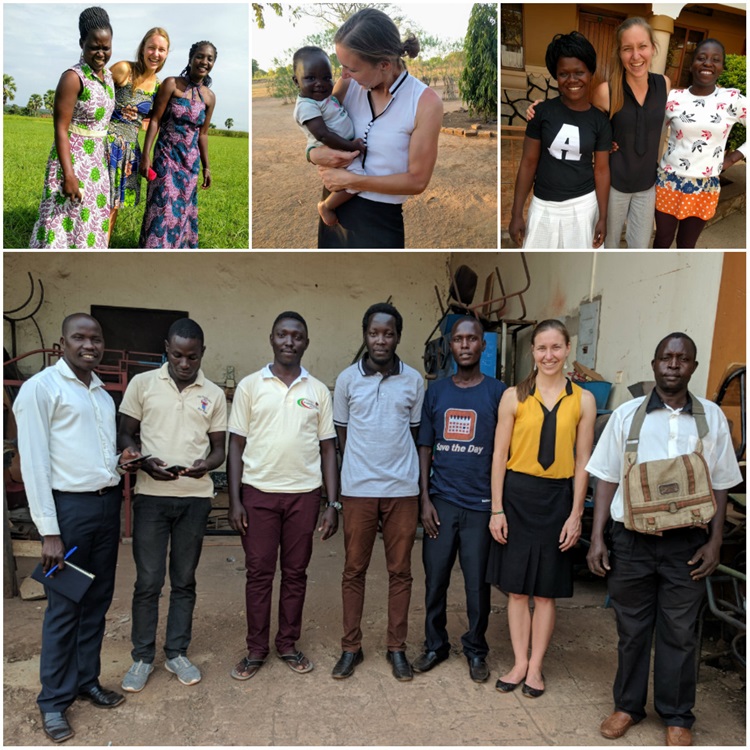
New Year: 2020 Vision of Hope
By: Paige Balcom, Rodman C. Rockefeller Centennial Fellow 2020; Co-Founder of Takataka Plastics and PhD student at UC Berkeley
Clk, clk, clk, thud. Clk, clk, clk, thud. Noisy machinery shredding and melting plastic. Products being cut and loaded on a truck. Hot, dense air. Young men in green coveralls exchanging playful banter in Acoli. This is my vision for Takataka Plastics in 2020.
I’m Paige Balcom, a PhD student in mechanical and development engineering at the University of California Berkeley and co-founder of Takataka Plastics. After living for nearly a year in a Ugandan village while on a Fulbright grant researching aquaponics, I fell in love with the Ugandan people and country. I partnered with ChildVoice, an NGO running a vocational school for child mothers—girls my age and younger who had experienced the trauma of civil war and abuses of poverty. I forged deep friendships with these girls while laughing and telling stories at the borehole when fetching water, washing clothes by hand, running barefoot over the field playing football, eating mangos until we burst, and rejoicing over soda at Christmas. Living in a mud hut (complete with lizards and the occasional rat), eating posho and beans nearly every day, dancing to the beat of drums, soaking in the spectacular sunsets, cuddling a child until he falls asleep, and joining in singing sincere, heartfelt prayers every evening taught me about the hardships millions of Ugandans face and also gave me an appreciation for the simplicity, joy, and strength of communal village life. The girls’ stories made me cry, gave me great respect for their strength and resilience, taught me how blessed my childhood and American life are, and filled me with a deep empathy for those with no voice. I determined to commit my life and work to help solve problems affecting my friends’ lives.
I felt a calling to continue working in Uganda, so I shifted my graduate school research plans and started a project on plastic waste in developing countries.
Plastic Waste Problem
I learned that plastic waste is causing a plethora of environmental and public health issues. Uganda generates approximately 600 tonnes of plastic waste daily, and outside of the capital there are no recycling options. Instead, plastic waste is burned—releasing carcinogens and greenhouse gases—or strewn on the roadsides, disrupting crops and blocking drains creating stagnant water breeding grounds for malaria-bearing mosquitos. The little plastic that reaches recycling plants in Uganda used to be exported to China, but since Southeast Asian countries have restricted plastic waste imports, the international market is drying up. When I interviewed Dr. Najib Lukooya from the Kampala City Council Authority, he asserted, “We’re really stuck and desperate” because Uganda has no way to deal with PET plastic waste (water bottles and soda bottles).
Many regions in Uganda are waste sinks—places where plastic gets in but doesn’t get out. For instance, Gulu, the country’s second largest population center, is 6 hours from the nearest recycling facilities in Kampala, so it’s not economically feasible to transport low-value waste to the capital. The plastic is stuck in Gulu—localized recycling and processing is needed.
Takataka Solution
I co-founded Takataka Plastics with Peter Okwoko, a Ugandan environmental and community activist and lecturer at Gulu University, to help solve the plastic waste sink issue. Takataka (meaning “waste” in Swahili) aims to locally transform plastic waste into quality, affordable construction materials to turn harmful waste into a resource, create jobs, and close a loop in the circular economy.
Since 60% of African youth are unemployed, we hope to help solve economic, environmental, and health problems by creating jobs to produce recycled plastic products for the booming $3bn Ugandan construction market. We’ve proven the basic concept with prototype machinery and are ready to scale up operations. Last year, we started a plastic collection campaign and built small machines to shred and safely melt plastic waste without releasing toxic fumes. Working with engineering students from Gulu University, we made prototype wall tiles that we can sell to contractors and hardware shops.
2020 Goals
The funds from the IIE Centennial Fellowship will help Takataka launch a pilot in Gulu. Our goal over the next year is to build machines big enough to recycle half of Gulu’s plastic waste (5 tonnes/month), create jobs for 30 Ugandans, and sell quality, affordable construction materials to builders.
I’m beyond excited to see what Takataka will do in 2020 and can’t wait to be back in Gulu, my second home. I’m extremely grateful for the opportunity to work with talented, passionate Ugandans to address problems affecting my friends’ lives. I’ve been counting the days until I’m back in Africa…dreaming of building machines to recycle plastic waste, biting into juicy mangos, and embracing old friends.
